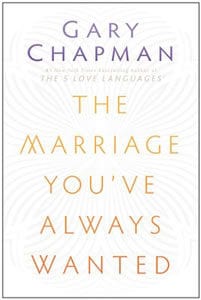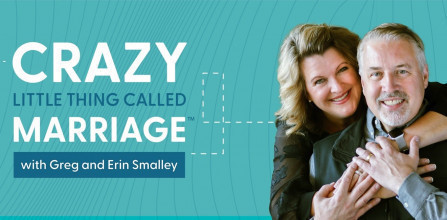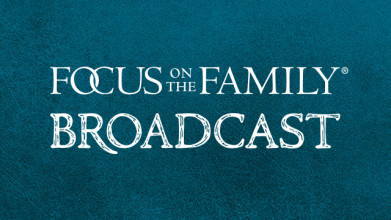Dr. Gary Chapman: You will meet some people along the journey that will give you a little tingle. There’s something about the way they look and the way they talk and the way they emote that will give you a little tingle. I don’t think it’s sinful, but it’s very dangerous if you’re already married.
John Fuller: Dr. Gary Chapman has some advice on how you can avoid an affair on today’s episode of Focus on the Family. Your host is Focus president and author, Jim Daly. And I’m John Fuller.
Jim Daly: John, we always enjoy when Dr. Chapman visits us, uh, here in the studios in Colorado Springs, but today, uh, we’re gonna share his great advice by featuring an excerpt from his DVD series called The Marriage You’ve Always Wanted. Uh, this is really good stuff. Exceptional marriage help. And there’s a book to go along with it. And, uh, let me just thank Dr. Chapman for allowing us to share it with you. And let me also say, whatever stage of marriage you’re in right now, there’s something here for you. So stick with us. Dr. Chapman sprinkles in a lot of humor, so I know you’re gonna enjoy it.
John: And for the sake of time, we’ll, uh, skip some of the introductory remarks. And here now, Dr. Gary Chapman on Focus on the Family.
Gary: We have inside of us a little love alert system, similar to a smoke alarm. And when you see certain people, there’s something about the way they look, about the way they talk, a- about the way they emote that gives you a little tingle inside. Now, I would not be giving you any new information if I told you that you can get the tingles after you’re married for somebody else. Mm-hmm. Happens every day of the week. Things aren’t going well in the marriage, okay? We came down off the high. We lost the tingles. And all we do now is argue or just stay away from each other. In a marriage like that, it started yesterday morning. Husband went to work. Could have been the wife just as easily. Yesterday, he went to work, it was 8:30, he did what he does every morning. He went to get his coffee. But yesterday, this lady walked up to the coffee pot and said to him, “Good morning.” Ooh. Kindest words he’s heard in months, “Good morning.” 8:30 in the morning. And her hair is combed.
Audience: (laughs)
Gary: And she smells good. And right away he feels a tingle. He goes back to work, and about 10:30 he sees her going for coffee and he gets thirsty.
Audience: (laughs)
Gary: “Are you new around here? Oh, what’s your name? Oh, where are you from? Oh, you know my friend? He used to work over there.” Little coffee pot conversation. And the next few days, he arranges for a few more coffee pot rendezvous. And if he thinks that she is feeling what he’s feeling, he will say to her, “How about lunch some day?” And if she agrees, they have a nice, innocent lunch. But on that first lunch, he tells her what it’s like at his house, just so she knows where he’s coming from. Married but unhappy.
And the next lunch, she shares her story. Every woman has a story. A history. And then they start having lunch rather regularly and they share rather freely with each other. And too much down the road, he says to himself, “Man, I don’t know what’s going on. It’s so easy to talk to this lady. I, I don’t have anything else to say to my wife. But it’s like we’re on the same wavelength.” And then he will say to her, “I know a really nice place for dinner if you would ever be interested.” And if she is, he will take her to a nice restaurant. I mean one that has fresh flowers and candles on every table. I’m talking nice restaurant. And a few more dinners and a few more rendezvous and he is saying to himself, “I don’t wanna hurt my kids. That’s the last thing I wanna do, is hurt my kids.” And then he will say, “But, you know, it couldn’t be good for the kids to be in our marriage and see the way we treat each other. You know that couldn’t be good for the kids.” And if he’s religious, he will say, “You know, maybe God just brought this woman along to give me a taste of true love.”
Audience: (laughs)
Gary: And too much later he leaves his wife and goes off with this lady. Why? Because he lost the tingles here. In fact, I can tell you what he’ll say at that point, “I, I don’t think we ever loved each other. I think it was just infatuation. I just don’t think we ever really did love. It was just never right from the beginning. Oh, but this relationship. This lady, she’s a 10.”
Now, his friends can see her flaws, but he can’t. His friends will say, “George, have you considered, uh, the woman’s been married seven times before?”
Audience: (laughs)
Gary: And George will say, “Give her a break, man. She married losers. I’m gonna make the woman happy. She deserves to be happy.” But you know what nobody ever told George? And he will never read this in a modern magazine. He will never see this in a modern movie. Only place you find this out is in the academic sections of the library. George doesn’t go there. We’ve studied this in love experience. Dorothy Tennov, Bridgeport, Connecticut, long-term study. You know what she found out? The average lifespan of the obsession is two years. Some a little longer, some a little less. Average two years. And George will come down off the high. And that’s when he’ll discover why seven other men left her and she’ll discover that he’s not Mr. Perfect, and the whole thing starts over again.
Now, folks, why would I talk about this with you? Because everybody in this building has the potential of feeling the tingles at the coffee pot. Don’t you think that you’re exempt. I don’t think it’s a sin to feel the tingles at the coffee pot. It’s not premeditated. You don’t get up one morning and say, “I think I get a cup of coffee and get the tingles for whoever shows up.”
Audience: (laughs)
Gary: No. It says that you will meet some people along the journey that will give you a little tingle. There’s something about the way they look and the way they talk and the way they emote that will give you a little tingle. I don’t think it’s sinful, but it’s very dangerous if you’re already married.
So can I give you a little help on how to handle the tingles at the coffee pot? The easiest time to handle the tingles is the first morning. You feel the tingles at the coffee pot and, and when you leave the coffee pot and go back to work, you take the tingles to God. And you say, “Oh, Lord, you know what I felt at the coffee pot.”
Audience: (laughs)
Gary: “And you know the thoughts that ran through my mind. But I wanna thank you that I don’t have to follow the tingles. Now, guide me as I go home and do my homework.” And you go home and do what I’m gonna teach you this hour, and that’s the day you swear off a coffee.
Audience: (laughs)
Gary: You don’t go back to the coffee pot at 10:30. In fact, you don’t drink coffee anymore.
Audience: (laughs)
Gary: If she leaves the company, you can drink coffee again. But right now, you don’t drink coffee.
Audience: (laughs)
Gary: And if you happen to sing in the choir or on the praise team at your church and you feel a tingle for somebody on the praise team and you wanna stay after rehearsals and talk, that’s the day you oughta resign the praise team. And if you’re on a church committee and you feel a tingle for somebody on the committee, that’s the day you oughta resign the committee. Now, you don’t say to the chairman, “I’m gonna have to resign because I have the tingle.” No, no-
Audience: (laughs)
Gary: … no, no, no, no. What you say is, “I have been praying and I believe it’s God’s will for me to resign the committee.” And I can tell you, it is God’s will for you to resign the committee. The easiest thing is you don’t let it happen. But what if you’ve already had the lunches, already had the dinners, already had the rendezvous, and you’re already into what the world calls an affair and what the Bible calls adultery? What you gonna do about that? There’s only one right thing to do with an affair. You break it off. “Oh, but I’ll die if we can’t be together.” No, you won’t die. We’ve studied that too.
Audience: (laughs)
Gary: No one in the history of this nation has ever died from breaking off an affair. Not one. Lotta folks die who didn’t break ’em off.
Audience: (laughs)
Gary: I did not say it was easy. I said it was right. It is not easy to break off an affair. Why? Because it is so obsessive in nature. I mean, you really do feel like you’re the happiest you’ve ever been and you’ll never be happy if you can’t be with that person. I’m telling you, it is not easy to break off an affair. But I’ve never met a man or woman who ever regretted doing right by breaking off an affair and coming back and working on the marriage. That they’re in my office every week and in counselors’ offices all over this country who did wrong five years ago and followed the tingles. And now, they’re in that second, third, or fourth marriage, and now they’re trying to get help. The easiest thing is don’t let it happen. You, you can’t keep yourself from feeling a tingle, which you don’t have to follow the tingles. And if you’re already into that journey, I’m challenging you to turn around and do what’s right and come back and reengage in your marriage and say no to the tingles.
John: Dr. Gary Chapman on Focus on the Family. And you can get his book The Marriage You’ve Always Wanted for gift of any amount when you call 800-A-FAMILY. 800-232-6459. Or, donate and request that at focusonthefamily.com/broadcast. Let’s return now to more from Dr. Gary Chapman.
Gary: I cannot tell you how strongly I feel about that. We’ve got to break this cycle in our country of leaving this person and going off with this person when we lose the tingles here and we get the tingles here. We, we cannot continue this. The greatest social problem we have today is broken marriages and broken families. And we’ve got to turn that around. And as Christians, we’ve got to take the lead in doing that.
Audience: Amen.
Gary: All right. Now, what is the biblical view of, of love? Well, here is 1 Corinthians 13. Look at these words. “Love is patient, kind, humble, courteous, unselfish, not quick to take offense, doesn’t keep a score of wrongs.” Now, look at those words carefully. This is not a definition. This is a description. But look at those words carefully. Those words are not describing a feeling. You don’t have to have the tingles to be patient, or kind, or humble, or any the rest of that. In the Bible, love is not basically a feeling. It is basically a way of thinking and a way of behaving. That’s why love can be commanded. Love is the attitude which says, “I’m married to you, how may I help you? How can I enhance your life?” It begins with an attitude. And we choose our attitude. Every single day, we choose to love our spouse or not to love our spouse. We choose to look out for their interest and think of what we can do to help them, or we choose not to. So, love is a choice that we make. It begins not with a feeling, but with an attitude.
Now, before I go further, I wanna say just a word about negative emotions. I don’t know about you, but I’m willing to admit that some days, I actually have negative feelings toward my wife. Not very often at this juncture in our marriage. But in the early years, almost every week. Now, why did I have negative emotions toward her? Because she did not live up to my expectations. The same reason she had negative emotions toward me. You see, you don’t ask for negative emotions. They just grab you. When your spouse doesn’t live up to your expectations, you feel negative, and negative thoughts come into your mind. They’re lazy, they’re irresponsible, they’re self-centered. All kind of those thoughts come along with negative emotions.
Now, what are you gonna do with these negative feelings? Let me suggest first of all a prayer. And the prayer is this. Father, thank you that I don’t have to follow my negative emotions. Now, folks, that’s good news. Because if I follow my negative emotions, I will give my wife a little speech about da, da, da and da, da, da and da, da, da and da, da, da. And by the time I get th- through with my little speech, she’ll have a little speech for me. That I’m not Mr. Perfect. And then I’ll give her a few words and she’ll give me a few words. And we will be on a downward spiral. How do I know? I’ve been there.
Now, we don’t have to do that. Rather, I can express love in the power of the Holy Spirit. Now, please notice I’m bringing God into this, because this is not natural. What is natural is to follow my emotions, and that’s what most couples do. And that’s why they end up arguing and after a while they feel like, “This is never gonna work out. We don’t agree on anything. All we ever do is fight.” And then one of ’em bails out the marriage. We don’t have to go that route. With the help of God, I can love her, even when I have negative feelings toward her.
Now, someone says, “Gary, isn’t that being a hypocrite? You’re feeling negative and you’re doing something positive.” And my answer’s, “No, we do that every day in other areas of life.” For example, I don’t know about you, but if I only got outta bed on the mornings I feel like getting outta bed, I’d have bed sores.
Audience: (laughs)
Gary: I go against my feelings almost every morning, including this morning. How about you?
Audience: (laughs)
Gary: Went against our feelings, got up and did something we thought was gonna be good. And before the day’s over, we feel good about having gotten up this morning. The same thing is true. We don’t allow the negative emotions and negative thoughts to control our behavior. We acknowledge them to God. You know what I’m feeling, Lord. And you know what I’m thinking, Lord. But I, I choose to love her, I choose to love him in. In your power, I move out to do or say something that will enhance their lives. And when I do, I create an atmosphere that’s positive. And then, I’m not saying that you ignore the things that stimulate the emotions. But once I love her and create a positive atmosphere, I can then say, “You know, honey, something’s been bothering me and I really wanna share it with you.” And because I have loved her rather than going in there and condemning her, she’s likely to hear what I have to say and we can work through that. So you don’t ignore the things that stimulate, but you don’t let those emotions control what you do.
All right. So how do we express love? Well, there’s only two broad categories. One is words, and one is actions. Let’s look at both of them and let’s apply the biblical definition. Such words as compliments. Compliments. 1 Corinthians 8:1 says, “Love edifies. Love builds up.” So we look for things that we can compliment our spouse about. “You look nice in that outfit. I really appreciate what you did.” It’s simply using words to, to verbally affirm the other person. Now, you know, I’ve had people to say, “You know, Dr. Chapman, I wouldn’t mind doing that, but I just can’t think of anything good to say about ’em, you know?”
Audience: (laughs)
Gary: Well, I’ve never met a man or woman that you couldn’t find something good. Something good. And when you say something good about them, I don’t care how small it is, you make them wanna be better. I remember when our kids were little, my wife would tell the kids what a great father I was. I mean, she poured it on. I know she went beyond reality.
Audience: (laughs)
Gary: You know? But every time she told the kids how good I was, it made we wanna be as good as she said I was. But you see, when we give critical words, it’s the opposite effect. So compliments, kind words. This has to do with the manner in which we speak. Kind words. Proverbs 15:1, “A soft answer turns away wrath or anger.” Do you know we don’t have to scream? Screaming is a learned phenomena. It can be unlearned. You can say anything you wanna say softly. You can even say negative things softly. Best way I know to describe this is to say that love makes request, not demands. Love says, “Honey, do you think it’d be possible for you to clean the gutters this weekend?” Request. Love doesn’t say, “If you don’t clean the gutters soon, they’re gonna fall off the house. They’ve already got trees growing out of ’em.”
Audience: (laughs)
Gary: Love says, “You know, honey, you know what I would like? You know what would make me happy?” Love makes requests, not demands. And then, non-defensive words. Love doesn’t defend itself. Wife says to husband, “I’m just… I just feel depressed.” What’s the husband say? “Depressed? What you got to be depressed about, woman? You got a easy life. You better snap out of it, woman.”
Audience: (laughs)
Gary: Look, if a woman feels depressed, a woman feels depressed. Wouldn’t it be better to say, “Tell me about it, darling. When did you start feeling this way? What do you think brought it on? Is there anything I could do that might be helpful to you?” Love receives what the other person is saying. Non-defensive words.
And then, present tense words. “Love doesn’t bring up past failures,” 1 Corinthians 13. I’m amazed at how many people mess up every new day they get with yesterday.
Audience: (laughs)
Gary: I just can’t believe you did that. I don’t know if I’ll ever get over it. You embarrass me in front of my family and everybody else. You should be crawling on your knees right now. Get that smile off your face.
Audience: (laughs)
Gary: And it happened five years ago. Five years ago. Folks, listen, I’m not minimizing pain. I know that when your spouse does certain things and says certain things, it’s like a dagger to your heart. And I know that even if they come and apologize and confess their wrong and ask you to forgive them, and even if you choose to forgive ’em, I know that the memory comes back. And when the memory comes back, it hurts again and you feel the pain again. I, I know that. What you gonna do with that after you’ve forgiven them? You take the memory and the pain to God and you say, “Lord, you know what I’m remembering today and you know what I’m feeling again. But I thank you that’s forgiven. Now, help me to do something good today.” And you don’t allow the pain of the past to mess up the future. Folks, this is the only day we have. But if we do something good with today, if we have a tomorrow, it’ll be better tomorrow if we do something good with today. But if we mess up every new day we get with yesterday, why should God keep giving us new days? I challenge you, don’t let the past control your behavior and your attitude.
Well, there’s a second major way we express love, and that’s by actions. Again, I’m going back to 1 Corinthians 13, it says, “Love is patient.” So we express it by patient behavior. This has to do with allowing your spouse, again, to be human. Allowing your spouse to misplace their car keys every three days-
Audience: (laughs)
Gary: … without giving them a lecture about, “God is a God of order.”
Audience: (laughs)
Gary: Folks, I’m telling you, there are some people who are wired in such a way mentally that they are going to misplace their car keys every three days the rest of their life.
Audience: (laughs)
Gary: And you can give them all these little pointers about hanging ’em on the little nail and, and putting a tennis ball on ’em, I mean- You can give ’em all those little pointers-
Audience: (laughs)
Gary: … but I’m telling you, there are some people that are gonna lose their car keys every three days. Best thing you can do is get three sets of keys.
Audience: (laughs)
Gary: And you say, “Honey, use these. I’m sure we’ll find the others, you know?”
Audience: (laughs)
Gary: Yeah. Patient behavior. Let your spouse be human. They’re, they’re never gonna be perfect. And then, kind behavior. Now, this has to do with the manner in which you do things. You know, guys, I’ve observed that some of us do kind things, but we don’t do them in a kind way. For example, here’s a husband who says, “Okay, I’ll take the garbage out if you get off my back, woman.”
Audience: (laughs)
Gary: I’m sorry, guys, you don’t get credit for that.
Audience: (laughs)
Gary: You may as well let the flies take the garbage out.
Audience: (laughs)
Gary: I mean, it’s a kind thing to take the garbage out. But if you’re gonna do it, why don’t you do it in a kind way? “Darling, it is my delight-
Audience: (laughs)
Gary: … to take the garbage out for you. I love you.” Let’s do it in a kind way, guys, and get credit for it. Kind behavior. Then there’s courteous behavior. This word literally means courtlike. It means doing some of the things you did when you were courting. You gals remember how close the two of you used to sit when you were courting? I mean, in the car, it looked like one person.
Audience: (laughs)
Gary: But now, you have bucket seats.
Audience: (laughs)
Gary: I was in the airport the other Saturday night, I was flying home from a seminar, and I was tired, I didn’t feel like reading. I was just sitting there. And a young couple came in and sat down several yards from me. And I, I just watched them. They hadn’t been seated 30 seconds before she reached over and started rubbing the back of his neck. And I said to myself, “Isn’t that sweet? Look at that.” You know that every one of you girls used to do that when you were dating? Every one of you girls used to do that. Why don’t you see if you can still do it, ladies? Right now. Just reach over.
Audience: (laughs)
Gary: It might hurt your arthritis, but give it a try. Yeah, see that? You can still do it. You can still do it. And some you guys, when you were dating, open the car door for her.
Audience: (laughs)
Gary: You did. Yeah, okay. You did. Mm, huh.
Audience: (laughs)
Gary: Yeah. Now, now, listen, I know that there are wives in today’s world that do not want husbands to open doors. Lady said the other day, she said, “I’m not a-, open my own door.” I’m not opposed to wives opening doors. But if I were you, I’d ask her what she prefers. Now, my wife trained me early on. From the day we got married, she wouldn’t get outta the car unless I opened the door.
Audience: (laughs)
Gary: I got to church one day, I was in the lobby, I looked back in the parking lot and-
Audience: (laughs)
Gary: … she was still in the car. Got that one down.
John: Well, we’ve heard such great wisdom from Dr. Gary Chapman today on Focus on the Family. And, uh, this audio is from his DVD series The Marriage You’ve Always Wanted. And we’re gonna feature part two next time.
Jim: This is really a great message. And I know that some of you might be in tears right now because you’re either in an affair or you suspect that your spouse might be, and you’re at your wits’ end. Let me just say, no matter what the situation, we’re here to help you. So please, give us a call. Let us pray with you. And then we’ll have one of our caring Christian counselors give you a call back just as soon as they can. And we would be honored to help you take the necessary steps to get back into God’s will for your marriage. Uh, that step is very important. And remember, it’s never too late. Many of the couples who attend our Hope Restored marriage intensives are literally at the end of their rope. Often, the divorce papers are already signed. But as these couples learn about each other’s emotional needs, they’re able to improve their communication and these marriages are restored. And when we follow up two years later after their visit, 80% of those couples say they’re doing really well and they’re still married, which is the key point. So please, get in touch with us and let us help you find the right resource for your situation.
And if your marriage is in good shape, we need your partnership. Helping marriages in these tangible ways takes time and financial resources. So please, donate and help us bring hope to marriages across the US and Canada. And when you give a gift of any amount, we’d like to send you Dr. Chapman’s book called The Marriage You’ve Always Wanted. It’s the perfect, uh, follow-up to what we heard today. And right now, special friends of the ministry have offered to double your gift, dollar for dollar, so that your donation will have twice the impact. Donate today to take advantage of this matching opportunity.
John: Yeah. And you can reach us when you call 800, the letter A, and the word FAMILY. 800-232-6459. Or, donate online and request the book The Marriage You’ve Always Wanted at focusonthefamily.com/broadcast. And if you enjoyed today’s presentation, please tell a friend to tune in next time, as Dr. Chapman explains the importance of learning the love language of your spouse.
Gary: And if the love tank is full, that is you genuinely feel loved by your spouse, then life is good. But if the love tank is empty and you feel like, “They don’t love me, they wish they weren’t married to me,” life can begin to look pretty dark.
John: On behalf of Jim Daly and our entire team, thanks for listening to Focus on the Family. I’m John Fuller, inviting you back as we once again help you and your family thrive in Christ.





















